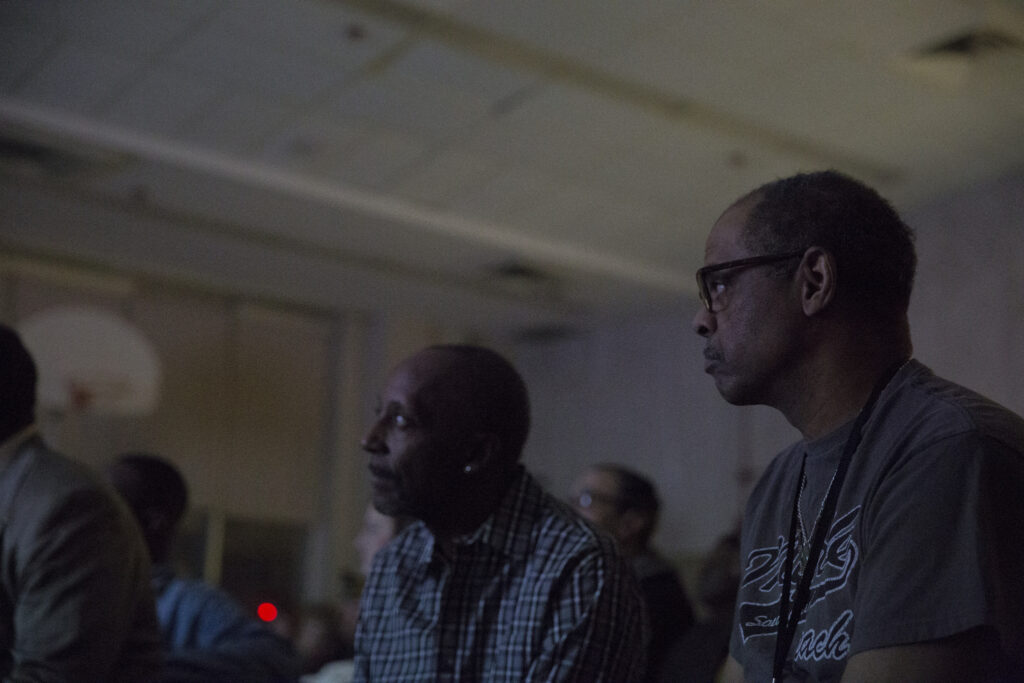New research published in Adm Policy Ment Health finds that African-American veterans receiving psychiatric treatment experience weaker relationships with providers, less engagement in treatment, and are less likely to adhere to medication than their White counterparts. Johanne Eliacin and fellow researchers explored the association between race and key components of patient engagement while controlling for important sociodemographic factors. Results indicate that race is significantly related to patient experiences of therapeutic factors considered to be instrumental in successful treatment.
“Racial differences in patient engagement may lead to wasted health resources and add to mental health disparities. An important step toward improving engagement among minority patients is to develop a better understanding of the relationship between race and engagement in mental healthcare.”

Members of the Jeff Clair Project watch historical movies about African-American troops in U.S. conflicts. Photo Credit: Milwaukee VA Medical Center, Flickr
Previous research has found that racial and ethnic minority patients are not only less likely to seek out mental health care services, but are also more likely to discontinue treatment earlier on in the therapy process. It is important to consider these findings alongside research related to the patient-provider relationship, also known as the working alliance, with minority patients, as this relationship is known to promote treatment retention, foster patient engagement, and serve as the facilitator of behavioral change and successful therapy outcomes.
Minority clients are more likely to experience impaired working alliance in treatment, lacking in effective communication and establishment of trust, which may be tied to lower levels of treatment engagement and positive outcomes in these populations, studies find. The authors note:
“These inequalities have been attributed to provider’s lack of empathy and, cultural competence, provider’s racial bias, as well as patients’ distrust in the health care system.”
The purpose of this study was to investigate the relationship between race and the two key components of treatment engagement: patient activation, which is understood to be the patient’s level of knowledge, skills, and confidence regarding health care management, and working alliance. Participants from two independent studies conducted at the same VA Medical Center were recruited from outpatient mental health clinics. All 152 participants were veterans receiving psychiatric treatment for one or more mental health diagnoses. The majority (82.9%) of participants were men with 63.2% identifying as African-American and 36.8% as White.
After conducting in-person interviews and assessing participants through patient activation and working alliance measures, researchers found that African-American veteran patients reported significantly lower scores on working alliance, patient activation, and medication adherence, than did White veteran patients. This association between patient activation and working alliance persisted after sociodemographic factors such as age, employment, education, and length of treatment were controlled.
While generalizability of this study is limited by the restrictive geographic location, conjoined samples, and a relatively small sample size, the findings support the existing literature demonstrating weaker patient activation in minority populations. Moreover, this study provides evidence for the associations between race, patient activation, and the working alliance, and contributes to the literature highlighting the experiences of minority patients in psychiatric treatment. The researchers encourage discussion to promote greater understanding of the barriers and avenues related to patient-provider communication and engagement overall.
“Future studies on patient engagement in minority patients should go beyond simply examining the association between race or minority group status and patient activation. Studies need to investigate the lived experiences of underserved populations in health services, and how these experiences influence engagement.”
****
Eliacin, J., Coffing, J. M., Matthias, M. S., Burgess, D. J., Bair, M. J., & Rollins, A. L. (2016). The Relationship Between Race, Patient Activation, and Working Alliance: Implications for Patient Engagement in Mental Health Care. Administration and Policy in Mental Health and Mental Health Services Research. doi:10.1007/s10488-016-0779-5 (Abstract)















Treatment? What is treatment? “medication adherence”
You do want poison, or you don’t want poison? You do? Oh that makes you a “good” patient.
Report comment
Maybe African-Americans are more sensitive to oppressive conditions and can more easily detect the deception behind the psychiatric facade.
Report comment
It has been long established, books written about just this, that race is a factor in the psychiatric system. Afro American men were in gross disproportion labeled as schizophrenic. And why would this be surprising, as all that the mental health system ever does is try to make people adapt to living in an unfair world, and without protest.
So we should not need to be having discussions about this. All we should be trying to do is to eradicate the mental health system, and to incarcerate the practitioners.
Problems of injustice should be handled in court rooms, and in the political arena, not in therapists’ offices.
Please Join:
http://freedomtoexpress.freeforums.org/index.php
Nomadic
Report comment
Previous research has found that racial and ethnic minority patients are not only less likely to seek out mental health care services, but are also more likely to discontinue treatment earlier on in the therapy process.
This reflects insight, as does distrust of all institutions rooted in slavery.
Since psychiatry is a branch of the prison system, not the health system, I’m sure these findings vis. a vis. race will have their counterparts regarding those in general population.
Report comment
This is a really important question, but there’s a lot left out. Were the Black veterans getting different sorts of diagnoses, and different sorts of treatment? Including medication? I’d be willing to bet they were.
A recent study found that one in six American adults had taken a psychotropic drug over the past twelve months. As usual, the study found that blacks were considerably less likely to be on a psych drug — but of those who were, it was something like three times more likely to be an antipsychotic!
There is good reason to think that black people are still more likely to be judged “dangerous” in the psychiatric system–and also more likely to be seen as “delusional” or “irrational.” They’re definitely more likely to be on monthly antipsychotic injections, and more likely to be treated against their will.
And while black people, despite all the hell they get put through in this society, are much less likely to commit suicide, there is one group for which that relationship has been reversed in recent years. That is, children under 15. The epidemic of drugging of poor children, and especially foster kids, has come down particularly hard on black children, I fear.
The system, and the nonprofit groups that “advocate” for the mentally ill, are always moaning about the reluctance of black people to seek professional help for mental health distress. I think it’s probably very rational–and at least sometimes a real survival advantage. We need to go straight to the source, and ask people about their experiences.
Thanks for this Zenobia!
Report comment
Again, does the prison system do surveys on why Black people don’t voluntarily show up to be handcuffed?
Report comment